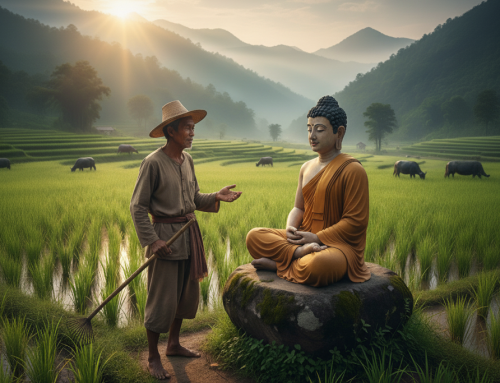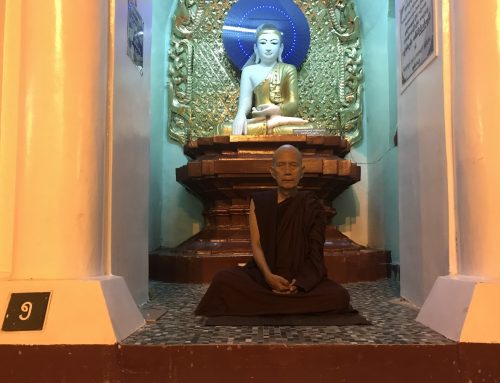In 2016 or so, my teacher, Thay Kozen, asked me, “Who is Scott?” I started out with the usual bio–born in NYC, schools, careers, hobbies, family, etc. This was an answer, but not the answer. Years went by living with this question. Answers such as Tat Tvam Asi* or Thou art That arose. Years went by and then I became more comfortable just being with the question without any attempt at an answer. I became very comfortable with a passage by Master Dōgen Zenji:
MASTER DOGEN’S GENJOKOAN INSTRUCTIONS ⊕
To study the Way is to study the self. To study the self is to forget the self. To forget the self is to be enlightened by all things of the universe. To be enlightened by all things of the universe is to cast off the body and mind of the self as well as those of others. Even the traces of enlightenment are wiped out, and life with traceless enlightenment goes on forever and ever.
~Dogen
Fast forward quite a few years. I sometimes visit a temple in Portland at which the teacher meets with people individually. He asked me, “Who are you?” I had no answer. I just sat there, uncomfortably. Driving home that night, a strong emotion came over me. This question made me feel as if he’d asked me to take a puppy and drown it in a bucket of water. The horrible feeling faded, but the experience stuck with me. What just happened? Buddhism teaches about the absolute truth and the relative truth. For example, we are all made of the same stuff, stardust, we are all interconnected just as the cells in our body are interconnected. Good and bad, right and wrong, sacred and profane… none of this is real. Those are, “absolute truths.” On the other hand, I love PB&J sandwiches, hate any color bell peppers, and there are times throughout the day, when finding a toilet becomes the most important thing in the world. Those are, “relative truths.”
It occurred to me that when I reacted so strongly to, “Who are you?” I was stuck in the absolute truth. When I realized this (many weeks later), I had to laugh at myself. I had subordinated the relative truth to the absolute truth. But both truths are valid. Simultaneously. A physicist might call this a quantum superimposition. The two truths, held simultaneously, are called the third truth, and is sometimes referred to as the middle way.
Now I can comfortably say, “I am.” And I was born in NYC, worked in advertising on 5th Ave., passionately love free diving on rainbow colored coral reefs, have been ordained as a Lay Buddhist Minister, love travelling, am a total NY style pizza snob, and feel strongly that ketchup has no place on a hot dog unless you’re under 10 years old. But above and beyond all that, I try to hold kindness and unity as my two guiding lights throughout every day.
Why is it so hard to embrace the relative and the absolute? Our human experience is largely contained within the confines of our body. There’s the self, and then there’s everything else that’s outside and separate.
Here are some examples of two seemingly contradictory truths. Imagine what would happen were you to embrace the one but not the other.
I am the most important thing in the world.
I am the least important thing in the world.
Something/someone is evil.
There is no good or bad, no right or wrong.
No one can cause me to suffer. Suffering is solely my responsibility; it’s something I bring on upon myself.
Choose who you associate with wisely.
We are born alone; we die alone.
Our birth/life/death are as a wave upon the ocean.
Therefore, given emptiness there is no form no sensation, no perception, no formation, no consciousness; no eyes, no ears, no nose, no tongue, no body, no mind, no sight, no sound, no smell, no taste, no touch, no object of mind, no realm of sight, no realm of mind consciousness. (Heart Sutra)
Eyes see, ears hear, nose smells, tongue tastes the salt and sour. (Identity of Relative and Absolute)
And in regards to the “self.” Is there a self or is there not a self? I like the quote from Shunryū Suzuki, a Japanese Zen Buddhist monk.
“How much ego do you need? Just enough so that you don’t step in front of a bus.”
*Tat Tvam Asi is a Sanskrit phrase meaning “You are That,” which conveys the core Vedantic principle that the individual soul (\(Atman\)) is identical to the ultimate reality (\(Brahman\)). This concept signifies the interconnectedness of all beings and the inherent divinity within each person, suggesting that by knowing the self, one can come to know the entire universe.







Leave A Comment